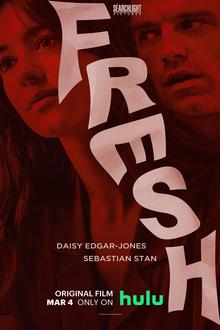One of the perils of trying to understand others—something that is vitally necessary for a humane and civil world—is facing difficult truths. Sometimes horror makes you do that. I’ve recently been trying to watch horror directed by women, as this gives another perspective on what’s scary. Directed by Mimi Cave and written by Lauryn Kahn, Fresh is very disturbing. Noa is a young professional who’s not having much luck dating. He best friend Mollie, who is African American, is the voice of reason in the film. Noa finds internet dating services inadequate, matching her up with losers, but then she meets a handsome, funny guy in the grocery store. She agrees to a date and they hit it off. So far, so good. Then he takes her to his place and abducts her. He explains that he’s a supplier of human meat for an ultra-wealthy circle and she is to be consumed.

I won’t say much more about the plot since you may want to disturb yourself some day, but I will say that the movie reinforces something I get from reading Carmen Maria Machado: women have to deal with men’s assumptions about their bodies. Even the institution of marriage is all about ownership; men don’t want to pay (the key word) for supporting someone else’s child. The nuclear family is intended to keep that at a minimum. Just a glimpse at social standards reveals that men are held less accountable for cheating than women are, largely because there’s never a question of who someone’s mother is. Noa’s captor is charming and nice. He’s also a (as later revealed) Satanic psychopath. He’s also also married, with children.
The film is disturbing on so many levels as it reflects on how a man feels he has the right, literally, to take women’s bodies. Habeas corpus indeed. It feels like being invited to dinner at Hannibal Lector’s house. The religion element—for there often is one—is only revealed in two short glimpses. One is the plate of one of the cannibals which has a Satanic symbol printed on it, and the other is a mid-credit shot of the butcher’s customers where the Satanic symbol reappears. This theme isn’t really explored in the movie, but it is equated with “the one percent of the one percent.” The clients are those who can afford anything and who crave the one thing they can’t have. This is a movie to keep you up at night but it’s also one with a very strong social commentary. That commentary is as disturbing as the entire premise of the film.
